| Srl | Item |
| 1 |
ID:
072550
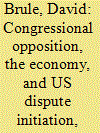

|
|
|
|
|
| Publication |
2006.
|
| Summary/Abstract |
Does congressional opposition constrain the president's conflict behavior in response to poor economic performance? Other research has shown that legislative constraints such as divided government reduce the executive's propensity to initiate conflict. But institutional constraints on democratic leaders may also make them likely to use force abroad when faced with deteriorating domestic conditions. The author argues that legislative constraints on presidential action during periods of economic decline compel the president to pursue alternatives that he can implement without congressional approval to display his leadership skills-including the use of military force abroad. The author examines the interactive effects of congressional opposition and economic performance on the propensity to initiate militarized interstate disputes from 1946 to 2000. The president is more likely to use force in response to economic decline when facing an opposition Congress than during years in which he enjoys partisan support in the legislature.
|
|
|
|
|
|
|
|
|
|
|
|
|
|
|
|
| 2 |
ID:
113904
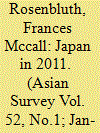

|
|
|
|
|
| Publication |
2012.
|
| Summary/Abstract |
Japan's government under the Democratic Party of Japan has limped along for another year, hampered by a divided legislature and an aging population reluctant to pay for the pensions and services it requires. The natural disasters of March 2011 were a tragic sideshow to the deep political problems that continue to plague Japan.
|
|
|
|
|
|
|
|
|
|
|
|
|
|
|
|
| 3 |
ID:
138175
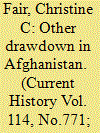

|
|
|
|
|
| Summary/Abstract |
On December 28, 2014, the combat mission of the NATO International Security Assistance Force (ISAF) in Afghanistan ended after 13 years. The transition to Afghan responsibility for security was heralded by ritually retiring ISAF’s green flag during a secret ceremony conducted in a basketball gymnasium inside the mission’s Kabul headquarters. During the event, the American ISAF commander, Gen. John F. Campbell, declared, “Our commitment to Afghanistan endures. . . . We are not walking away.” The confidence of the commander was strangely disconnected from the reality of the insurgency raging outside. After all, the ceremony was held surreptitiously out of fear: The Taliban have long been able to conduct deadly attacks at will in the capital.
|
|
|
|
|
|
|
|
|
|
|
|
|
|
|
|
| 4 |
ID:
100973
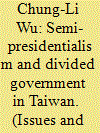

|
|
|
| 5 |
ID:
190032
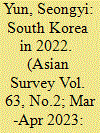

|
|
|
|
|
| Summary/Abstract |
At the presidential and local levels, progressives were replaced by conservatives in 2022. But the National Assembly is still dominated by the opposition Democratic Party, so the government is more divided than ever. As a conservative government came into power in South Korea, North Korea fired the most missiles ever, and inter-Korean relations were very strained. The economy is in serious condition due to inflation, interest rate hikes, and slowing growth.
|
|
|
|
|
|
|
|
|
|
|
|
|
|
|
|
| 6 |
ID:
113940
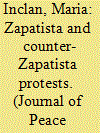

|
|
|
|
|
| Publication |
2012.
|
| Summary/Abstract |
This study represents the first systematic analysis of the interactions between pro-Zapatista and counter-Zapatista protestors in Chiapas, Mexico, and the first empirical test of movement-countermovement theories in a transitional democracy. Three claims are tested: (1) movement protests trigger countermovement protest activity; (2) different political parties at different levels of government trigger movement-countermovement protest activity; and (3) victories won by one side of a conflict, viewed as procedural concessions, trigger further pro- and countermovement protest activity. These hypotheses are tested using negative binomial models and data on Zapatista-related protest activity between 1994 and 2003. The results show that: (1) movement and countermovement protests have a positive, reciprocal effect on both groups' future protest activity; (2) movement and countermovement protesting groups use the dominant political party as a target of protest. The characteristics of the electoral cycle and rise of multi-party competition at all levels of government do not have a consistent effect on protest activity; (3) granting procedural concessions to pro-movement actors generates more protest activity among both groups. However, granting procedural concessions via social programs and public works to the population irrespective of its sympathy to either side of the movement-countermovement conflict decreases movement protests and increases countermovement protests.
|
|
|
|
|
|
|
|
|
|
|
|
|
|
|
|